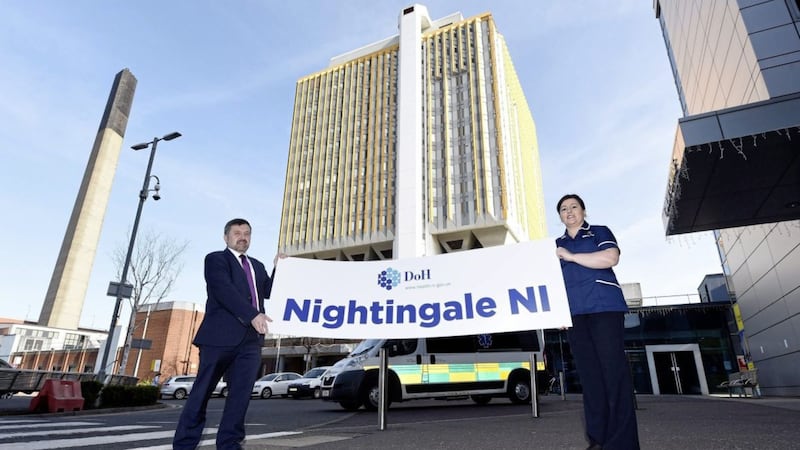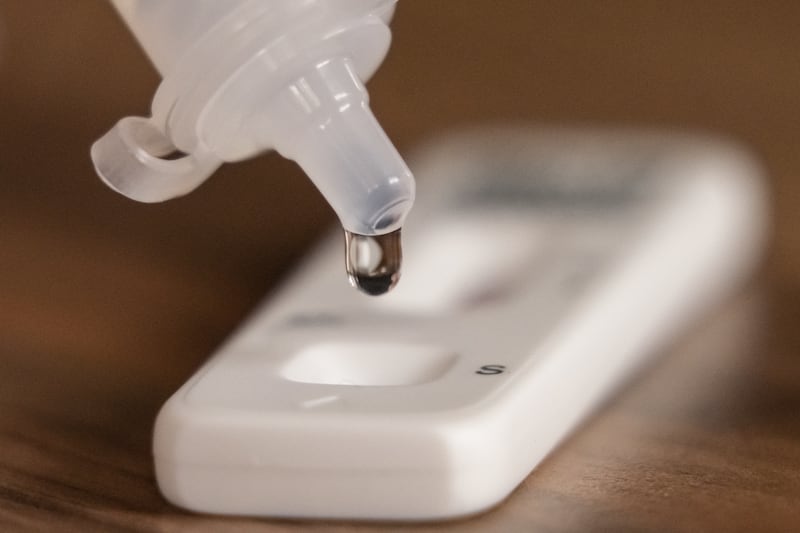PLANS are being made to wind down Northern Ireland's 'Nightingale hospital' for coronavirus patients due to much smaller numbers than expected - with just 26 cases on Monday.
The Irish News has learned that a memo circulated among senior health service management last week revealed that the 230-bed regional facility, based at Belfast City Hospital, is "ready and prepared" for a second wave of the virus but the most seriously ill will be treated elsewhere.
It is understood the city's Mater Hospital, which was the original Covid-19 centre but closed its Intensive Care Unit (ICU) when the Nightingale opened on April 7, is to receive ICU referrals again and is among "options" being discussed to return as the main coronavirus hospital for the north.
Sources say that a small number of wards in Belfast City Hospital will be on 'standby' in the event of a second surge in the virus.
Only suspected and confirmed Covid-19 patients are currently seen in the north's Nightingale, which is one of 10 specially designated hospitals across the NHS created to deal with an "extreme surge" in ICU admissions and deaths.
Earlier this week, it emerged the 4,000-bed London Nightingale centre in London's Docklands area was also to be placed on standby and no longer admit patients due to the tiny numbers - less than 20 - it was treating.
One senior employee based at the City hospital said many wards are "lying empty" and there was a "lot of uncertainty" among hundreds of staff who had been redeployed to work at the site.
Of the 26 patients admitted on Monday, none required ICU admissions.
"It's an eerie place to walk through now as it's so quiet. While it's good there hasn't been the big surge everyone thought was coming, there are a lot of agency workers, including domestics and nurses, who been told they'll have no work at the end of the month," he said.
"A few weeks ago we were being told to cancel our leave but now we're getting memos to tell us to take it when we can. There's very few patients in ICU and I think people want it go back to normality and get the elective surgery going again."
In late March, the north's health service was overhauled with hundreds of highly skilled doctors and nurses redeployed to work in the 10-storey tower block at Belfast City Hospital, with one consultant likening it to "an army".
It was estimated that 200 staff - which also included pharmacists, radiologists, physiotherapists and cleaners - would be required to work across each of the floors while the hospital was transformed to accommodate 230 critical care beds.
Operations and procedures previously carried out in the City hospital included those for urology, gastro and gynae cases. There was also a ward for stroke patients and the elderly.
Latest figures from the Department of Health show a total of 26 coronavirus patients were being treated in hospital ICUs across the north on May 4.
When asked about the future of the Nightengale facility and plans to re-introduce routine surgeries which had been suspended, a department spokesman last night confirmed that health trusts are now "considering how best to maintain services for Covid-19 patients".
He added they were also looking at "re-engaging other services that had been scaled back as a result of the pandemic".
"The BCH tower was designated as Northern Ireland's Nightingale in the event of an extreme surge," he said.
"Fortunately, the impact of social distancing has meant that individual trusts have been able to manage critical care demand without the need for regional escalation.
"The Nightingale is currently being used to treat a mixture of Covid-19 patients requiring critical care and acute medical care."








